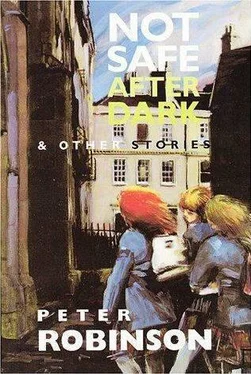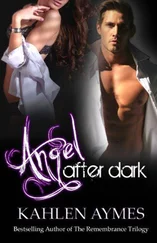But I did not dare make a pass; I feared her rejection and her laughter far more than anything else. While we do not have the capacity to choose our feelings in the first place, we certainly have the ability to choose not to act on them, and that was what I was trying to do, admittedly more for my own sake than for hers.
•
When I did see April alone again it was late in the morning of 3 May, and I was still in bed. I had been up late the night before, trying to concentrate on a Faulkner paper I had to present at a conference in Brussels that weekend, and as I had no actual classes on Fridays I had slept in.
The soft but insistent tapping at my door woke me from a dream about my father in the trenches (why is it we never seem to dream at night about those we dream about all day?) and I rubbed the sleep out of my eyes.
I must explain that at the time, like the poor French workers, I wasn’t paid very much and consequently, as I didn’t need very much either, I lived in a small pension in a cobbled alley off the Boulevard St Michel, between the university and the Luxembourg Gardens. As I could easily walk from the pension to my office at the Sorbonne, as I usually ate at the university or at a cheap local bistro, and as I spent most of my social hours in the various bars and cafes of the Latin Quarter, I didn’t really need much more than a place to lay my head at night.
I stretched, threw on my dressing gown and opened the door. I’m sure you can imagine my shock on finding April standing there. Alone . She had been to the room only once previously, along with Brad and a couple of others for a nightcap of cognac after a Nina Simone concert, but she clearly remembered where I lived.
‘Oh, I’m sorry, Richard-’ She had started calling me by my first name, at my insistence, though of course she pronounced it in the French manner, and it sounded absolutely delightful to me every time she spoke it. ‘I didn’t know…’
‘Come in,’ I said, standing back. She paused a moment in the doorway, smiled shyly, then entered. I lay back on the bed, mostly because there was hardly enough room for two of us to sit together.
‘Shall I make coffee?’ she asked.
‘There’s only instant.’
She made a typical April moue at the idea of instant coffee, as any true French person would, but I directed her to the tiny kitchenette behind the curtain and she busied herself with the kettle, calling out over her shoulder as she filled it and turned on the gas.
‘There’s trouble at the university,’ she said. ‘That’s what I came to tell you. It’s happening at last. Everything’s boiling over.’
I remembered that there was supposed to be a meeting about the ‘Nanterre Eight’, who were about to face disciplinary charges the following Monday, and I assumed that was what she meant.
‘What’s happening?’ I asked, still not quite awake.
April came back into the bedroom and sat demurely on the edge of my only chair, trying not to look at me lying on the bed. ‘The revolution,’ she said. ‘There’s already a big crowd there. Students and lecturers together. They’re talking about calling the police. Closing down the university.’
This woke me up a little more. ‘They’re what?’
‘It’s true,’ April went on. ‘Somebody told me that the university authorities said they’d call in the police if the crowds didn’t disperse. But they’re not dispersing, they’re getting bigger.’ She lit a Gauloise and looked around for an ashtray. I passed her one I’d stolen from the Café de la Lune. She smiled when she saw it and took those short little puffs at her cigarette, hardly giving herself time to inhale and enjoy the tobacco before exhaling and puffing again. ‘Brad’s already there,’ she added.
‘Then he’d better be careful,’ I said, getting out of bed. ‘He’s neither a student nor a French citizen.’
‘But don’t you see? This is everybody’s struggle!’
‘Try telling that to the police.’
‘You can be so cynical sometimes.’
‘I’m sorry, April,’ I said, not wanting to offend her. ‘I’m just concerned for him, that’s all.’ Of course, I was lying. Nothing would have pleased me better than to see Brad beaten to a pulp by the police or, better still, deported, but I could hardly tell April that. The kettle boiled and she gave me a smile of forgiveness and went to make the coffee. She only made one cup – for me – I noticed, and as I sipped it she talked on about what had happened that morning and how she could feel change in the air. Her animation and passion excited me and I had to arrange my position carefully to avoid showing any obvious evidence of my arousal.
Even in the silences she seemed inclined to linger, and in the end I had to ask her to leave while I got dressed, as there was nowhere for her to retain her modesty, and the thought of her standing so close to me, facing the wall, as I took off my dressing gown was too excruciating for me to bear. She pouted and left, saying she’d wait for me outside. When I rejoined her we walked to the Sorbonne together, and I saw that she was right about the crowds. There was defiance in the air.
We found Brad standing with a group of Anarchists, and April went over to take his arm. I spoke with him briefly for a while, alarmed at some of the things he told me. I found some colleagues from the literature department, and they said the police had been sent for. By four o’clock in the afternoon the university was surrounded by the Compagnies Républicaines de Sécurité – the CRS, riot police – and a number of students and lecturers had been arrested. Before long even more students arrived and started fighting with the CRS to free those who had been arrested. Nobody was backing down this time.
The revolution had begun.
•
I took the train to Brussels on Saturday morning and didn’t come back until late on Tuesday, and though I had heard news of events in Paris, I was stunned at what awaited me on my return. The city was a war zone. The university was closed, and nobody knew when, or in what form, it would reopen. Even the familiar smell of the city – its coffee, cheese and something slightly overripe aroma – had changed, and it now smelled of fire, burnt plastic and rubber. I could taste ashes in my mouth. I wandered the Latin Quarter in a dream, remnants of the previous day’s tear gas stinging my eyes, barricades improvised from torn-up paving stones all over the place. Everywhere I went I saw the CRS, looking like invaders from space in their gleaming black helmets, with chinstraps and visors, thick black uniforms, jackboots and heavy truncheons. They turned up out of nowhere in coaches with windows covered in wire mesh, clambered out and blocked off whole streets apparently at random. Everywhere they could, people gathered and talked politics. The mood was swinging: you could taste it in the air along with the gas and ashes. This wasn’t just another student demonstration, another Communist or Anarchist protest; this was civil war. Even the bourgeoisie were appalled at the violence of the police attacks. There were reports of pregnant women being beaten, of young men being tortured, their genitals shredded.
This was the aftermath of what later came to be known as ‘Bloody Monday’, when the ‘Nanterre Eight’ had appeared at the Sorbonne, triumphantly singing the ‘Internationale’, and sparked off riots.
I had missed April terribly while I was in Brussels, and now I was worried that she might have been hurt or arrested. I immediately tried to seek her out, but it wasn’t easy. She wasn’t at her student residence, nor at Brad’s hotel. I tried the Café de la Lune and various other watering holes in the area, but to no avail. Eventually I ran into someone I knew, who was able to tell me that he thought she was helping one of the student groups produce posters, but he didn’t know where. I gave up and went back to my room, unable to sleep, expecting her gentle rap on the door at any moment. It never came.
Читать дальше










![Джеймс Чейз - Not Safe to Be Free [= The Case of the Strangled Starlet]](/books/417649/dzhejms-chejz-not-safe-to-be-free-the-case-of-the-thumb.webp)

